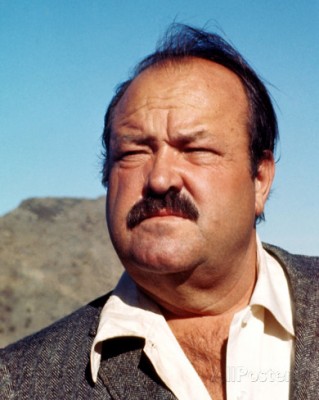| Reviews & Columns |
|
Reviews DVD TV on DVD Blu-ray 4K UHD International DVDs In Theaters Reviews by Studio Video Games Features Collector Series DVDs Easter Egg Database Interviews DVD Talk Radio Feature Articles Columns Anime Talk DVD Savant Horror DVDs The M.O.D. Squad Art House HD Talk Silent DVD
|
DVD Talk Forum |
|
|
| Resources |
|
DVD Price Search Customer Service #'s RCE Info Links |
|
Columns
|
|
|
Cannon: The Complete Collection
Starring William Conrad.
With Guest Stars Barry Sullivan, Murray Hamilton, Tim O'Connor. Special Guest Star Buddy Ebsen.
Tonight's Episode: Fat Man on a Soft Transfer
Act One
Hoping against hope, I thought that maybe - just maybe - in the five-plus years since CBS/Paramount released Cannon Season Two, Volume Two, the last half-season set of the popular 1971-76 private eye show to see the light of day, the company might have seen the wisdom in remastering the whole series, and that VEI, distributor of Cannon: The Complete Collection, would be able to boast of new, high-def transfers.
The DVD market has dwindled, of course, and Blu-ray seems to have settled into a niche market, but for distributors like CBS/Paramount there's still plenty of money to be made licensing catalog titles into syndication, on cable, and innumerable foreign markets. When I worked at MGM I was amazed that things like Green Acres and The Addams Family were being sold to far-flung cable markets in places like Turkey, Moldova, and Pakistan.
But no, Cannon: The Complete Collection utilizes the same soft, blurry, blotchy, and occasionally damaged analogue masters probably dating back to the early 1980s, if not the late ‘70s.
On one hand, I'm glad to at least have access to the entire series, but licensee VEI is being deceptive if not outright dishonest in the disclaimers preceding these shows. (But, significantly, mentioned nowhere on the packaging.) What they essentially claim is that these video transfers look terrible because the show is old, and that old movies and TV shows look terrible in their natural state. Needless to say, that's total B.S. Cannon was shot on 35mm film, until very recently the industry standard for movies since the 1890s and numerous television series since the late 1940s. Numerous other CBS/Paramount-owned shows, from I Love Lucy to Gunsmoke to the concurrent Barnaby Jones, likewise shot in 35mm, all look great. Last night I watched the 90-year-old Phantom of the Opera, a silent film, and even it looked terrific. Statements like that, and VEI is hardly alone, do themselves, their customers, and a general understanding of what's possible and what simply is unaffordable, a great disservice. And it comes awfully close to flat-out lying. "The episodes on this disc were authored using the best available masters" doesn't tell the full story, but at least that's honest. And, I believe, disappointments like this would go down better if companies like VEI and CBS/Paramount were forthright and told consumers words to the effect of, "While we'd love to create new high-def transfers, the expected revenue doesn't justify the money we'd have to put into it. Nevertheless, we figured fans of the series would like to at least be able to purchase the entire run of the show, imperfect though it is."
Alas, the story doesn't end here. A number of DVD labels seem to using technology to author discs that might be cheaper and/or faster, which creates highly noticeable authoring flaws. Cannon, along with some other series I've seen recently on DVD (Quincy, M.E. being another), exhibits an unnatural jerkiness, almost a pixilation effect, whenever there is motion: a speeding car, an actor walking across a room, etc. It's very distracting some of the time, and makes these already ancient video masters appear even worse than they need to be.
Act Two
Cannon was a so-so, by-the-numbers private eye show built around a great central performance. William Conrad had been kicking around Hollywood since the mid-'40s, making a memorable appearance as hit man Max in the classic noir The Killers (1946). His steely-blue eyes and intimidating presence typecast him in similar parts for the next few years until 1952, when CBS's radio division cast him as Marshal Matt Dillon on Gunsmoke. As the saying goes, he had a great face for radio. Nonetheless, fans of the radio series lobbied hard for Conrad to be cast in the 1955 TV version but, of course, James Arness won the role. Conrad kept busy doing voice-over work, narrating shows like Rocky & Bullwinkle (he's very funny there), along with occasional movies like Battle of the Bulge (1965).
He got into the production side of the business during the 1960s, directing a few films, of which the not bad Brainstorm (1965) was his best effort. He was friendly with studio head Jack L. Warner, who presented Conrad with a very special gift indeed: the 45-pound lead Maltese Falcon that Sydney Greenstreet madly attacks with a knife at the climax of John Huston's classic 1941 film. After Conrad's death, it was sold at auction for just under $400,000.
One assumes it was Conrad's stint as the God-like narrator of producer Quinn Martin's The Fugitive that helped land him the title role on Cannon, another QM series. Cannon epitomized the '70s TV detective, frequently played by not-quite-leading men character stars (Raymond Burr, Peter Falk, Buddy Ebsen, Dennis Weaver) and usually they were distinctive: Ironside was disabled, in a wheelchair, Barnaby Jones was old, Columbo was disheveled and lowbrow, McCloud was a cowboy in the Big City, and so on.
Rather than ignore Conrad's weight the writers played it up - too much so, really. Music cues featuring comical tuba riffs follow him everywhere, and practically everyone makes wisecracks about his stomach. Even kids are shown to be enormously tactless: "How did you get to be so fat?" they'll ask. After a while you begin to wonder if anyone in America had manners. To his credit and despite that enormous gut Conrad maintained an impressive, almost ramrod posture throughout the show, which made him seem a lot taller than he actually was. (He looks to be about 5'9" or so, and reportedly weighed as much as 260 lbs. during Cannon's run.)
At times it's hard to swallow scenes like that found in one episode where Conrad, already shot in the knee, no less, is able to elude lithe bad guy Tom Skerritt, who even uses a truck in pursuit of the fat P.I. on foot. And yet, Conrad's weight works in favor of the show in some ways. If the villains can beat up big William Conrad, they really must be something. Indeed, poor Cannon is shot in many episodes and set afire at least once. He is a pretty big target, after all.
For his part, Conrad seems to have taken it all in stride. Onscreen, Cannon maintains an extremely healthy sense of humor about his weight, but more importantly the actor is really superb in the role. His wonderfully expressive voice capitalizes on the potential of every phrase of dialogue and, visually, he's just as good. When chatting with suspects or witnesses Conrad comes off as remarkably authentic, talking like we all imagine a real private investigator would, flattering some, threatening others, all the while intensely staring into the souls of the people he interviews.
The other gimmick, less important and more ordinary, is that Cannon is a retired police detective-turned-private eye, mixing high profile work (in the TV-movie pilot, we first see him returning from a big money job in Yokohama) with charity cases: solving the murder of old pals, helping poor clients with nowhere else to turn, etc.
As a show, the main thing in Cannon's favor is that it's very slightly more adult with darker, more complex characters than the usual detective series, and that Cannon's investigative techniques are logical and more believable than the run-of-the-mill detective show. Conrad seems to relish the opportunity to star in his own series 16 years after being shut out of Gunsmoke. Some of Cannon's later episodes provide some backstory on his police detective years, notably the season five premiere "Nightmare," which has Cannon determined to find the man responsible for the murder of his wife and son 20 years earlier. Conrad really stretches here, atypically overcome with real emotion during the climax. As an actor, Conrad is greatly missed.
Act Three
Cannon - The Complete Collection contains all 120 episodes in extremely bland, very dated and problematic transfers described in more detail above, but which have the look of dirty, suds-less dishwater. Back in 2010 they were already mediocre, but by 2015 standards they somehow seem worse. The high-def norm has raised everyone's standards of acceptability, and the aforementioned authoring issues make it look even worse than it needs to be. Audio is mono English only with no subtitle options. The set is spread over five DVD cases, with up to seven single-sided DVDs per. At least the shows appear complete, not time-compressed, and retain their original underscoring.
Act Four
The only real supplement is The Return of Frank Cannon, a pretty good 1980 "reunion" TV movie but, sadly, it looks as bad as the regular episodes. What's called a "photo gallery" is little more than a collection of worthless screen grabs.
Cannon - The Complete Collection is something hard-core fans will want to have, and understandably so, as it's highly unlikely this will be remastered for home video anytime in the next decade. And that's a shame, really. With a $188.89 SRP, consumers deserve better.
Stuart Galbraith IV is the Kyoto-based film historian and publisher-editor of World Cinema Paradise. His new documentary and latest audio commentary, for the British Film Institute's Blu-ray of Rashomon, is now available.
|
| Popular Reviews |
| Sponsored Links |
|
|
| Sponsored Links |
|
|
| Release List | Reviews | Shop | Newsletter | Forum | DVD Giveaways | Blu-Ray | Advertise |
|
Copyright 2024 DVDTalk.com All Rights Reserved. Legal Info, Privacy Policy, Terms of Use,
Manage Preferences,
Your Privacy Choices | |||||||
















